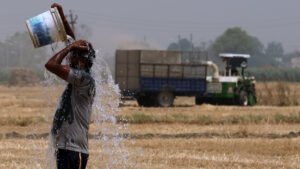Physical Address
23,24,25 & 26, 2nd Floor, Software Technology Park India, Opp: Garware Stadium,MIDC, Chikalthana, Aurangabad, Maharashtra – 431001 India
Physical Address
23,24,25 & 26, 2nd Floor, Software Technology Park India, Opp: Garware Stadium,MIDC, Chikalthana, Aurangabad, Maharashtra – 431001 India

According to a new report, severe heat waves, which have caused thousands of deaths across India over the past few decades, are occurring more frequently than ever before. Soon, the nation may experience heat waves that are too intense for humans to survive, making it one of the first places in the world to do so.
The country is reportedly seeing higher temperatures that arrive sooner and last much longer, according to a World Bank report titled “Climate Investment Opportunities in India’s Cooling Sector.”
It stated that the recent heat wave verifies what many climate scientists have long warned about with regard to rising temperatures across South Asia, predicting that heat waves in India could exceed the human survival limit.
“In April 2022, India was plunged into the grip of a punishing early spring heat wave that brought the country to a standstill, with temperatures in the capital, New Delhi, topping 46 degrees Celsius (114 degrees Fahrenheit). The month of March, which witnessed extraordinary spikes in temperatures, was the hottest ever recorded”, the report said.
The report drew attention to the IPCC’s Sixth Assessment Report’s (AR6) August 2021 warning that the Indian subcontinent would see increasingly frequent and severe heat waves during the ensuing ten years.
It also cited the G20 Climate Risk Atlas’ warning from 2021 that, if carbon emissions continue to be high, as in the IPCC’s worst-case emission scenario, heat waves in India are predicted to persist 25 times longer by 2036–65.
India’s increasing heat could harm economic output
The report also issued a warning that the country of India’s increasing heat could harm economic output. Further, it claimed that among South Asian nations, India suffered the most effects from heat exposure on hard labour, losing more than 101 billion hours annually.
“Up to 75 percent of India’s workforce, or 380 million people, depend on heat-exposed labor, at times working in potentially life-threatening temperatures. By 2030, India may account for 34 million of the projected 80 million global job losses from heat stress associated productivity decline,” the report said.
According to a McKinsey & Company analysis, by the end of this decade, lost labor due to rising temperatures and humidity might threaten up to 4.5 percent of India’s GDP, or roughly USD 150–250 billion, the report said.
A trustworthy cold chain network is the need of the hour
A trustworthy cold chain network would be necessary for India’s long-term food security and public health security, according to the report. It needs a working cold-chain refrigeration system to transport food and medicinal products across India, the report added.
The report further highlighted that prior to COVID-19, India, the third-largest pharmaceutical producer in the world, lost about 20% of temperature-sensitive medicinal items and 25% of vaccines as a result of faulty cold chains, resulting in losses of USD 313 million annually.
“As temperatures rise across India, so will the demand for cooling. However, in a country where two-thirds of the population live on less than USD 2 a day, and where the average cost of an air-conditioning unit can vary between USD 260 and USD 500, air-cooling systems are a luxury available only to a few,” the report said.
“Indoor and electric fans can help to maintain thermal comfort, but these too are expensive to buy and inefficient. As a result, many poor and marginalized communities across India are more vulnerable to extreme heat, living in inadequately ventilated, hot and crowded homes without proper access to cooling”, the report warned.
The Way ahead
India’s cooling plan may simultaneously reduce the threats that the heat poses to people’s health and way of life, reduce carbon emissions, and establish India as a centre for producing environmentally friendly cooling systems.
The India Cooling Action Plan (ICAP), which aims to help deliver sustainable cooling and thermal comfort for everyone, was launched by the Indian government in 2019 in response to the complicated cooling energy trends and difficulties that India is currently facing. The thematic cross-sectoral areas of ICAP that were the focus of this study included building space cooling, cold chain and refrigeration, and transport air-conditioning and refrigerants.
To assist in achieving the ICAP aims, the authors of the study suggested specific and scaleable interventions that can be accomplished through collaborations with various actors.
The study finds that concessional finance by multilateral development banks, financial institutions and the private sector will play a key role in helping India develop financial instruments and innovative models to accelerate the adoption of sustainable cooling measures.